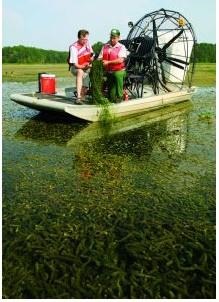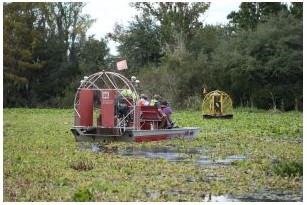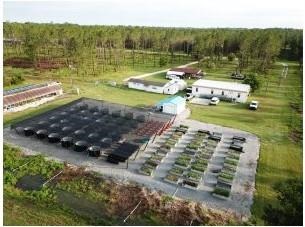By Jason Ferrell
Since it was established in 1978, the UF/IFAS Center for Aquatic and Invasive Plants (UF/IFAS CAIP) has been responsible for many innovative discoveries that have positively impacted not just Florida but the whole nation. Based on this success and the length of time dedicated to our mission, it is easy to think that CAIP occupies a space all on our own. That is until we are reminded that the US Army Corps of Engineers (USACE) was charged with managing water hyacinth in the St. Johns River in 1899 with the passing of the Rivers and Harbors Act. With over 120 years of invasive plant management experience at USACE, CAIP remains the new kid on the block.

Army Corps scientists have historically been located at the Waterways Experiment Station in Vicksburg, Mississippi, now known as the US Army Engineer Research and Development Center (ERDC). From this location, their team has worked on projects in the Great Lakes, the Pacific Northwest, and all across the south. However, with its nutrient-rich waters and long growing season, Florida has been a focal point for research and development at USACE and the University of Florida for several decades. As such, these two teams have worked closely, leveraging strength, funding, and creativity to deliver solutions and move the entire field of invasive plant management forward.
This partnership was taken to the next level in 2004 when an ERDC scientist, Dr. Michael Netherland, was officially stationed at CAIP. Through a cooperative agreement, Dr. Netherland was provided an office, access to university research space, and was even granted courtesy faculty status in IFAS. This inevitably led to tremendous synergy as our two groups began to collaborate on research, share graduate students, and even partner in annual outreach events.

These collaborations continue to this day as Dr. Ben Sperry is now the ERDC scientist stationed at CAIP. With this partnership comes benefits for all, namely in the sharing of equipment and development of research space.
In 2019, we completed construction on our large-tank research area. The USACE provided thousands of dollars of equipment and supplies to the project while IFAS invested similarly in time and construction. The result is the largest and most elaborate aquatic plant research facility at any university in the nation. The benefit of this facility is that it provides tanks that are over 5 feet deep and contain 1200x gallons of water. This more closely simulates “real world” conditions for submersed plants like hydrilla and provides the opportunity to conduct replicated research that was previously impossible. This facility could only have been brought to reality with the combined efforts of the USACE (Jacksonville District and ERDC) and UF/IFAS.

State and federal partnerships are always desirable but often not attainable. Fortunately, CAIP and USACE have many shared goals and values that lead to seamless collaboration that only continues to strengthen. With unwavering support from UF/IFAS and partnership with USACE, the Center for Aquatic and Invasive Plants will continue to turn science into solutions.
Source : ufl.edu